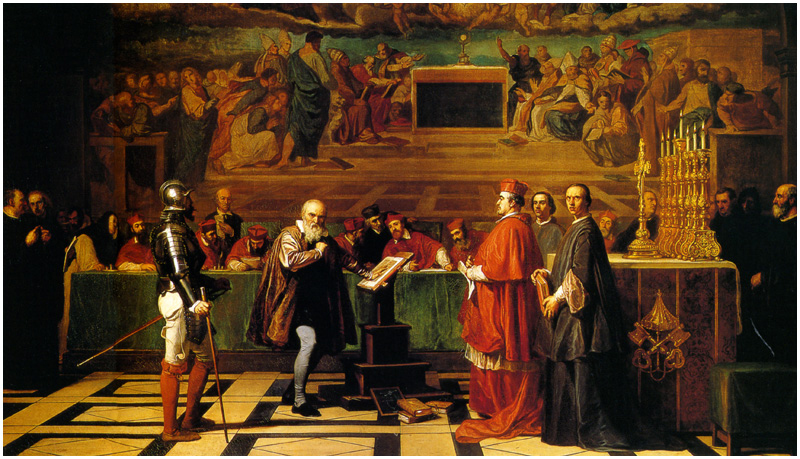Malcolm Roberts is no Galileo, but he would make a fine Inquisitor.

Galileo’s appearance before the Roman Inquisition is depicted in this 1847 painting, Galileo before the Holy Office, by Joseph-Nicolas Robert-Fleury (Musée du Luxembourg)
The self-belief of Malcolm Roberts was put to the test in last week’s ABC panel discussion, Q&A, and the newly-minted One Nation senator for Queensland came out with flying colours.
There was laughter in the audience and indifference from the panel at his claim that the world isn’t warming and there’s no human link to climate change, but that only seemed to stiffen his resolve.
He didn’t blink when he said that most climate scientists don’t believe humans cause warming, that global climate models are “hopelessly wrong”, that current sea level rise is “natural and normal” and that rising carbon dioxide levels are a result of warming, not a cause.
When British physicist Brian Cox run through a string of broken climate records, culminating in a NASA graph showing unprecedented global temperatures, his composure was something to behold.
He cited a 2014 claim by a Steven Goddard that “the 1930s were warmer than today” and that NASA had manipulated temperature data to reduce temperatures in the 1930s and inflate them in recent years, adding, “That’s a fact.”
Saying “that’s a fact” doesn’t make it so. Goddard (a pseudonym – his real name is Tony Heller) has never authored a paper on climate change in a peer-reviewed science journal, and his claims about NASA corruption have been supported only by the most rusted-on contrarians.
Roberts would wear that badge with pride. If we want to understand his self-assurance, a good starting point is an Australian group in which he has been the leading voice, the Galileo Movement.
In the early 1600s, when the Catholic Church was teaching that God made Earth the centre of the universe, Galileo’s observations of the heavens led him to write that Earth revolved around the sun. He wasn’t the first to say so, but he’s the one Roberts wants us to remember.
In 1633 the Roman Inquisition formally found Galileo guilty of heresy and ordered him to recant, which he did. Contrary to the views of some he wasn’t executed or tortured or thrown into a dungeon. He died an old man after living out his days under house arrest at his Tuscan villa.
Galileo defied the orthodoxy of his time and was ultimately vindicated. In the 21st century Malcolm Roberts has sought to take on that mantle, but it’s not a good fit.
The Galileo Movement says it honours Galileo’s achievement in replacing religious doctrine with “solid observable data” and standing up to “entrenched, dogmatic religious and state beliefs suppressing the truth”.
“He was enslaved that we could be free,” says the movement’s manifesto. “His greatest gift is beyond his science, it is our freedom… That is now threatened as ideology seeks to replace science and control seeks to replace freedom.”
To Roberts, scientists who don’t share his views are dogmatic ideologues suppressing truth and threatening freedom. That sentiment has motivated a string of hectoring letters he has written over a decade (posted on his website) to scientists, their employers, bureaucrats and politicians.
He would have us believe that the modern equivalent of the Inquisition, manipulating the public debate about climate, is the established scientific order, represented in Australia by universities and bodies like the Bureau of Meteorology and CSIRO.
Dan Brown or Michael Crichton couldn’t have come up with a thicker plot: Brian Cox as front man for a bunch of grand inquisitors hell-bent on taking over the world (via the UN) and ruining the global economy on the false pretext that burning fossil fuels is bad for us.
It sounds funny, but Malcolm Roberts, mining engineer, is soon to be sworn in as Senator Roberts. Alongside his party leader, Pauline Hanson, and two other One Nation senators he can now bring his zeal to our nation’s parliament, already home to a cohort of climate change deniers.
The spirit of the Inquisition lives on, as Malcolm Roberts says. Ideology is being used to mask some inconvenient science and protect entrenched positions.
But the inquisitors of today are not to be found in the Brian Coxes of this world. Cloaked in certainty and impervious to criticism, they come in the likeness of Roberts himself.
